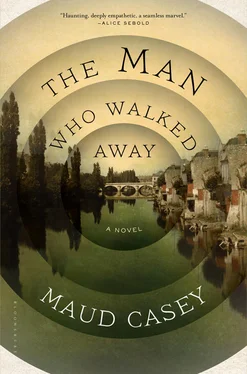At the sound of the clunk, clunk of the plates, the great doctor turns, fixing the photographer with his owly stare. “ Everything I’m about to do is worth recording,” he says.
“I do not have the time,” the girl says again.
“She is capricious,” says the great doctor.
The Doctor recognizes the sour look that crosses the great doctor’s face; he felt it in his own face as Albert told his story of being arrested as a nihilist assassin in Moscow, and shame burns through him.
Out of his coat pocket the great doctor pulls an amulet on a string. “There will be three distinct stages.”
Dangling the amulet before the girl’s eyes, he swings it back and forth, back and forth, back and forth. “You are tired. So tired. You are sleeping and you are nothing.” The hairy bear steps back, arms folded, watching the amulet until his chin falls to his chest and he snaps to attention, looking out into the audience like a guilty child.
It seems impossible to the Doctor that this same fierce girl could be tired, or sleeping, or nothing, but her eyes move back and forth, back and forth, and her lids grow heavy. Soon her head is nodding; soon it falls to her chest.
“Here we have the lethargic state,” the great doctor says. “The appearance of a deep sleep. Suggestion is impossible. But a certain muscular hyperexcitability. . pressure upon the facial nerve, for example. .” He nods to the hairy bear, who presses a thick finger into the girl’s left cheek.
Flash: an image of a spasm in the left side of her face, distorting itself into a grimace, while the right side remains utterly still.
“The cataleptic condition,” the great doctor says. He lifts the girl’s face in his hand, almost tenderly, prying open one closed eyelid. Simultaneously, the hairy bear lifts the girl’s left arm, spreads her fingers, and puts them to her lips as if she is about to throw a kiss.
Flash: an image of the girl smiling broadly, throwing a kiss to the audience.
There is a smattering of polite applause.
Shhhh!
There is something missing, the Doctor thinks. What was he listening for? The thump thump of the monkey? No, it is the girl’s anguished keening he is waiting for.
“You are very tired,” the great doctor says. “You are so tired. You are sleeping.” She begins to slide down the back of her chair as though she is being poured. “And now, somnambulism.” She is sinking to her knees, pressing her hands together in the semblance of prayer, when suddenly there is a great crash and the shattering of glass.
The great doctor turns in the direction of the noise, slow and steady as the swing of the amulet, and the eyes of the entire amphitheater follow. The jagged pieces of a plate, slipped from his bony fingers, lie at the feet of the photographer.
The Doctor’s stomach drops; he recalls his sneeze and the heat of the great doctor’s gaze. The photographer is no longer floating; he is no longer invisible. It is as if he had crashed to the floor along with the plate. It is hard to tell from here, but the Doctor swears he sees a tiny smile of satisfaction on the man’s face.
“Did I hire an orchestra to take photographs?” the great doctor says as the photographer frantically picks up the shards of glass.
“A stampeding herd of elephants?”
The photographer’s thin legs become tangled until one of his feet slips out from underneath him and a poof of sawdust rises all around him. He puts his hand out to protect his face as he falls, and when he stands, blood runs down his long arm. There is their blood, the Doctor thinks.
The great doctor is silent now. In the photographer’s hurry to get to his feet, he falls again. When the photographer drops the second plate, the shattering glass echoes through the quiet.
This time he rises slowly to his feet. “No,” he says into the silence of the amphitheater. “No,” he says again. The word hangs in the air as he walks slowly, proudly, out of the amphitheater. But once the hairy bear sweeps away the glass and the blood-flecked sawdust, it is as if the photographer had never existed at all. What photographer?
The great doctor turns back to the girl. “Our statue of living pain,” he says in the same steady, unwavering voice as before, and the Doctor feels it pulling the audience’s attention with it— Come into the great house of my voice, look into all the secret rooms— and his too.
The statue of living pain is not where the great doctor had left her.
When the glass shattered, the girl rose from her knees and began walking slowly toward the table with the platter. At first she appears to be reaching for the brain itself, and the Doctor thinks, She will eat it. But it isn’t the brain she wants. She picks up the straitjacket instead, slipping her arms expertly through the sleeves.
“Please,” she says, turning her back to the hairy bear, lifting the hair from her neck. “Buckle me in.”
It is not a happy story , Albert has said again and again. But an unhappy story doesn’t always begin unhappily. The Doctor imagines the girl as a child at the dinner table. Maybe there are two gangly older brothers who wrestle unless they are told not to, one writhing body with many limbs. Maybe there is a mother. She is not eating enough , the mother says, eyeing the stew her daughter has barely touched. Maybe there is a father. She never eats enough , the mother says to him. He recently moved his family to the city so he and his sons could work in the textile factory that has dyed their fingers an indelible blue. She is fine , he says, without looking up. The same conversation every night. He could speak any words as long as he uses the same reassuring tone: Rats ate mine. What a vine. There is time . The fact is the girl is fine, rosy and plump. She has always been this way. She is one of those children who brim with love. What does it matter if she eats less than her brothers, who eat and eat with their blue fingers unless reminded to use a fork? If she is healthy, if she shines with life, what does it matter? The Doctor will never know it, but he is partly right. There has been happiness for the girl; there has even been happiness for her here in the great doctor’s hospital. It is only once she is retired, only when she is no longer the great doctor’s best girl, that happiness disappears altogether. It is then she will lose track of the days, which seemed for a while to be adding up to something — those moments when the audience oooed and aaahed , all of those eyes on her as she moaned or dreamed up something lodged in her throat (let them use their imaginations), those moments when she was the doctor’s best girl. She was the doctor’s best girl even, perhaps especially, when she did something to cause a look of concern on his face. It is when she is removed from her private room to make room for the next best girl that she will understand he is done with her, and when she is returned to the general population of women in the large room, her strength will leave her altogether. Some of the women in the large room will look like her mother — that woman in the corner there, when she turns a certain way and remains enough in the shadows — but they are not her mother who died some months ago. The girl will grow smaller still. Eventually, she will lose track of herself altogether; there will be days when she can’t distinguish herself from the woman in the corner there or that one there or that one there. She will sleep as often as she can; in her dreams it isn’t dark. In the sunlight of her dreams, her mother’s face returns to her, a face that expected nothing of her, that was satisfied to watch her knead dough, content even to watch her shirk her duties and gaze out the window on to a view the girl always complained about — why did they have to live in such a shabby place? In those dreams, her mother’s face says, you are my own girl. In the dark room though the girl will continue to fade until one day, when no one is watching, her light will go out completely.
Читать дальше












